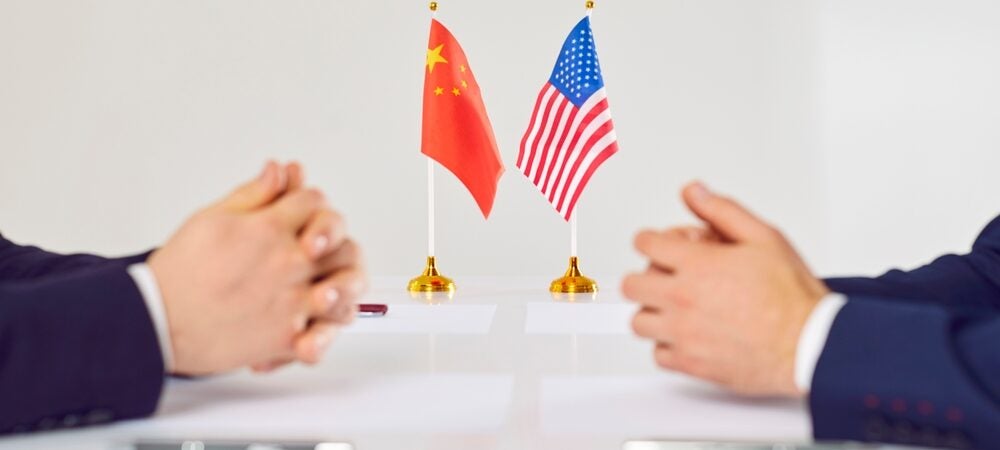In a world where U.S.-China bilateral trade challenges seem insurmountable, last week’s World Trade Organization (WTO) Ministerial Conference provided a glimmer of hope that the two largest economies of the world still can work together constructively in a multilateral setting to narrow differences.
An agreed-upon vaccine waiver from WTO intellectual property protection (IPR) obligations is a case in point. For many months, differences centered on the scope and duration of the waiver, with India and South Africa leading the developing world in arguing for broad coverage beyond vaccines and a long implementation period. But, even after these difficult matters were solved, one critical issue remained — whether China, a major manufacturer and exporter of vaccines but also a self-designated developing country, would also have the ability to use the waiver, a complete non-starter for the United States.
In an important move in May, Chinese officials announced publicly that Beijing would not avail itself of this exception. However, for the United States, a public statement was insufficient — a written commitment was needed to make it binding. Beijing refused to go that far. This impasse was overcome during the long ministerial meeting week in Geneva with U.S. and Chinese officials quietly working together to find an accommodation. Their efforts were captured in a footnote to the waiver text, with language that makes China’s public statement legally binding.
This accommodation removed the last hurdle for the IPR waiver, paving the way for its adoption by all WTO members. Importantly, its significance may not just be a one-off development. It can potentially serve as a model to address a continued source of friction between China, the U.S. and certain other WTO members — namely China’s insistence on maintaining its developing country status under the WTO, even though it’s the second-largest economy in the world. Additional Chinese commitments to opt out of the benefits and breaks extended to developing countries in specific WTO negotiations, both new and ongoing, could potentially go a long way in de-escalating tensions surrounding this contentious matter.
The final package of WTO Ministerial deliverables also demonstrates that the United States and China share common interests in many aspects of substantive WTO work, as well as in the continued functioning of the multilateral trading system. Too often, U.S.-China trade tensions have been blamed for the recent woes of the WTO. Certainly, this friction has contributed to the WTO’s difficulties in conducting its core functions of negotiating, resolving disputes and monitoring implementation.
While growing acrimony between Washington and Beijing has spilled over to Geneva, with barbs between the two delegations becoming commonplace in meetings, their cooperation at the inisterial conference shows that the United States and China can still work together where interests overlap. In addition to reaching a mutually acceptable solution on the IPR waiver, both countries were strong supporters of other aspects of the ministerial package, including the continuation of the customs moratorium on digital products and services, measures to respond to the pandemic, and pledges to avoid export restrictions on food.
Still, deep divisions persist. The 20th anniversary of China’s accession to the WTO, marked last December, was largely a somber occasion. Rather than converging more closely with the market-oriented economies of the WTO, as was expected by many, Beijing has doubled down on its state-led economic model in recent years. This has allowed China to benefit from existing WTO rules while simultaneously enjoying the unfair advantages of its undisciplined anti-competitive practices, prompting policymakers in the United States and elsewhere to question the decision to support China’s WTO accession.
Cooperation at the recent ministerial conference by no means suggests that the U.S and China have turned a corner and will now see eye-to-eye on matters more broadly. As WTO members implement the conference outcomes and pursue a wide-ranging reform agenda, there will be major challenges that China and its more market-oriented trading partners must face. Members will, for example, need to grapple with trade-distorting industrial subsidies and the anti-competitive behavior of state-owned enterprises if the WTO is to remain credible and relevant.
The daunting work ahead demands collaboration and compromise of a sort that has been in short supply in recent years, particularly between Washington and Beijing. In the lead-up to the ministerial conference, prospects for success seemed slim. But with the announced package of outcomes, last week proved to be a relatively good one for the multilateral trading system, and for U.S.-China trade relations in particular. Hopefully, it will beget more progress, even if limited, in the weeks and months ahead.
Wendy Cutler is Vice President of the Asia Society Policy Institute.
To read the full commentary from The Hill, please click here.

